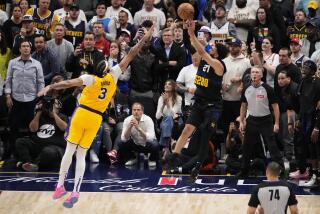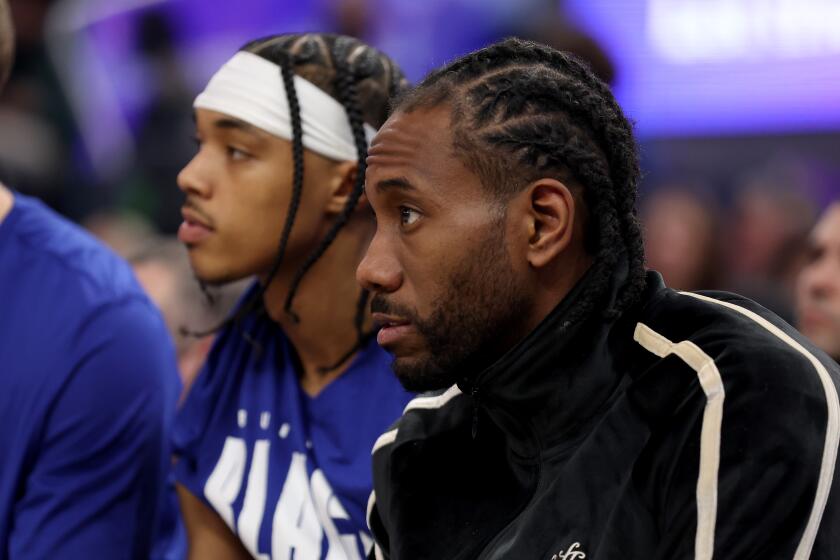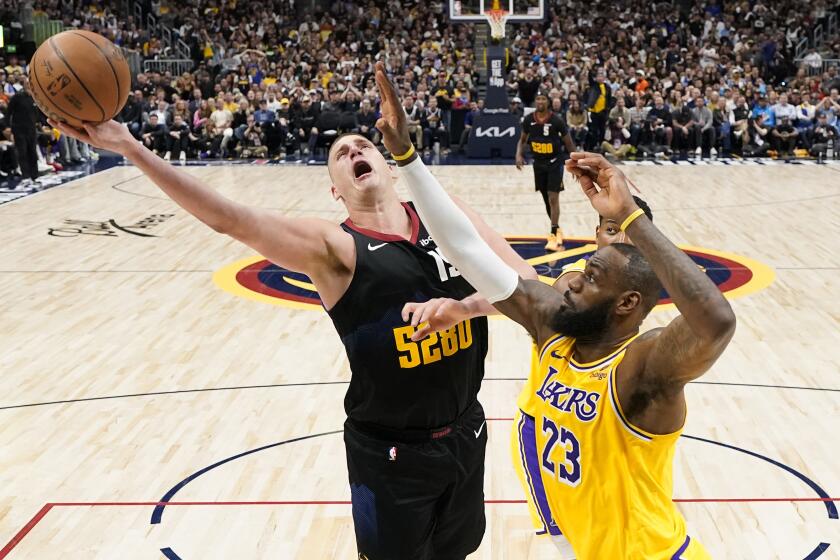Ramsey Has That Look
Rookie quarterback Patrick Ramsey will make his first start for the Washington Redskins on his home field Sunday against the charging New Orleans Saints. And again, the football fans of Washington, the best sports town in the NFL, will be expecting big things.
But gold and glory may not come this soon. Ramsey was appearing as a relief pitcher in Week 5 when he rescued the Redskins, upsetting the Tennessee Titans with a 268-yard passing day at Nashville, 31-14.
Such a thing happens sometimes in football: A starter is injured. A young quarterback delivers when placed unexpectedly on the field. Even so, the world usually looks different to the same young quarterback a week later when, after one good performance, he’s called on to do it again after a full week to think about it. To worry about it. The Saints, moreover, play ferociously in even-numbered years, and this is one of those. But keep an eye on Ramsey. He wears the look of a comer.
Smart and Football Smart
THE MORNING-AFTER headline was on the fifth of six NFL pages, yet it seemed prophetic: A Star is Born for Spurrier. That’s Steve Spurrier, the new Redskin coach, whose personnel people found Ramsey, their first draft choice, in New Orleans. A Louisiana native, he had played behind Shaun King at Tulane, replacing him when King went to Tampa Bay. In Ramsey’s college days, the one thing you could say against him was that he didn’t run very fast. If anything keeps him from being a great pro quarterback, it will be that. Immobility is what finally caught up with Ram quarterback Kurt Warner.
In almost every other respect, Ramsey could (and still can) be called a brilliant prospect. At 23, he’s big enough, 6 feet 2. He showed the Nashville crowd that he has NFL passing sense. He’s a powerful-armed javelin thrower, a state champion who won a bronze medal one year at the Pan-American Games. Capping it all, the most conspicuous thing about Ramsey, they say, is his intelligence. He is both smart and football smart. A month after his last game at Tulane last December, he graduated with degrees in accounting and finance after a long academic career as an honor student. The Spurrier system works best when the quarterback is an associate coach. Ramsey seems a fit.
Critics Don’t Like Smart Guys
THE LATEST EXAMPLE of a quarterback prospect who looks good one week as a relief pitcher but falters as a starter seven days later is Jamie Martin, who played well for the Rams in Week 4, then tumbled, along with his teammates, in Week 5. They fell apart in San Francisco, where, in the first week of Kurt Warner’s new injury absence, the 49ers won the game in the first quarter before running the final score to 37-13.
The result will sound all too familiar to anyone who saw the Rams in their last sad years in Los Angeles and Anaheim.
It isn’t easy determining what’s happened to the club whose offense was the talk of the league only last year and the year before and the year before that. Most critics are laying the blame on Ram Coach Mike Martz’s “ego and arrogance,” as they put it relentlessly. But that’s the one aspect of the Ram problem that is irrelevant.
It can be said of most persons (including Martz’s critics) that they have an ego. And of those who seem less than arrogant, most simply lack the self-esteem to act it. Arrogant tribal leadership is what’s kept the human race alive all these years. From 1999-2001, Martz’s team played uniformly smart offensive football because Martz is a smart guy. But a lot of people don’t like smart guys. Lose a few and you find out how many.
The NFL is constructed—above all leagues in this or any sport—to elevate different winning teams. In interurban sports, isn’t that the way it should be? The Chicago Bears would be next if they had a Martz there.
Two Tries for Redman, Two A’s
TWICE IN THE same week, Chris Redman has won A grades at quarterback for the Baltimore Ravens, who upset the Denver Broncos Monday night, 34-23, and then the Cleveland Browns Sunday, 26-21. Thus in a seven-day period, the whole scene in the AFC North has seemingly changed.
The league will learn more about that Sunday. As the NFL’s only division leader playing no more than .500 ball, the 2-2 Ravens will be at Indianapolis, where quarterback Peyton Manning has lifted the 3-1 Colts to the top of the AFC’s new Southern Division.
Between seasons as well as into the new season, Pittsburgh seemed to be the front runner of the AFC North, with Cleveland second, and Baltimore far behind while Coach Brian Billick overhauled. The volatility of pro football, often remarked, is rarely more keenly illustrated than in the changes that have come so swiftly to this division.
The quality of Billick’s defensive team, which won Super Bowl XXXV, is such— even after the overhaul—that all he needed to contend again was a princely quarterback. If that’s Redman, who is 25, the Ravens are back. Son of a high school coach, their new quarterback was drafted in the third round of 2000 out of Louisville, where he was the protege of an alumnus, Hall of Famer Johnny Unitas. The bloodlines are impeccable.
Swift Teams Lift Vermeil
IN ANOTHER AFC headliner this week at San Diego, the Kansas City Chiefs will come in with a team that ranks no higher than last in the high-quality AFC West after three big Sundays. The streak began at New England last month when in a free-scoring game the Chiefs lost by a field goal, 41-38, solely because they lost the overtime coin toss. Next, the Chiefs rapped Eastern leader Miami, 48-30, before overcoming the preseason-favored New York Jets, 29-25.
Kansas City Coach Dick Vermeil, 66, is doing it there much as he did it five years ago at St. Louis. Needing a quarterback that first season, the Rams chose Trent Green, and, after Green was injured, Kurt Warner. Needing a running back, they chose Marshall Faulk. In Kansas City, needing a quarterback and running back as usual, the Chiefs brought Green over from the Rams and Priest Holmes in from Baltimore.
In other words, after all his years on Earth and in football, Vermeil, who in a short tour at UCLA won a Rose Bowl game before he left, understands that no NFL team can go anywhere without talent at the two prime offensive positions. Nothing is more important. Some well-paid NFL coaches today still haven’t figured that out.
In Holmes, who advanced the Chiefs 233 yards on runs and passes in the Jet game, Vermeil has one of the most unusual running backs in the league. At 5-9 and 205 pounds, Holmes isn’t particularly strong or tricky, nor is he a hard slicing runner like, say, Terrell Davis. He just keeps going and going. And, so far, so does Vermeil.
Twenty-one Years Out of Football!
THE VERMEIL STORY is the NFL’s version of college football’s Bobby Bowden story or Joe Paterno story. They’ve all decided that contrary to popular belief, football is a young man’s game only if you think it is. It’s an old man’s game if you think that. As Shakespeare said, it’s thinking that makes it so.
But unlike Bowden and Paterno—unlike anyone else you’ve ever heard of—Vermeil, who’s had three separate tours in pro ball (at Philadelphia, St. Louis and Kansas City), was out of the game for 21 years after leaving Philadelphia before resuming at St. Louis.
Twenty-one years on the sideline—a radio and TV analyst all that time—and then back to football. Four questions:
After getting the Eagles to Super Bowl XV, why did he leave Philadelphia in 1982? Coining a new American cliche, he said, I’ve burned out.
Why did he come back to the NFL in 1997? With a chance to coach the Rams, he told himself, I want to prove I can still do it.
After the Rams won Super Bowl XXXIV, why did he leave the NFL again? He told himself, Well, I’m 64, I can’t prove anything more.
Offered Kansas City in 2001, why did he come back again? He realized—as did Michael Jordan when he kept coming back to basketball—The game is my life. Coaching football is what I want to do. I love it. I’ll do it.
Vermeil Ahead of the Curve
THE OTHER VERMEIL questions today: How long will he stay in Kansas City? It’s anyone’s guess. In what respects has he changed? Still as intense and emotional as ever, he’s become a people guy who in his approach to coaching is far more positive than he ever used to be. How does he adjust to the new generations he throws in with? He stays ahead of the curve. He keeps his players and coaches ahead of the game strategically, forcing them to think about that instead of about the old man in charge.
For instance, when most of Vermeil’s rival coaches were as afraid as ever to pass the ball, he started throwing. When other coaches announced that the age of 300-pound players had arrived, he showed them that speed is more important—the most important physical trait in football.
Like no other football coach in the last 75 years except Hall of Famer George Allen—who in 12 consecutive winning NFL seasons turned around two losers, the Rams and Redskins—Vermeil has been called in four times to turn around bad or mediocre teams and has so far made three of them champions within three years of becoming head coach.
First, Vermeil changed UCLA into a Rose Bowl winner, then took Philadelphia to its only Super Bowl, then coached the Rams to their only Super Bowl championship. After a one-year absence, he is in his second year with the Chiefs.
It’s worth noting no doubt that Vermeil came into the NFL as Allen’s protege—as, to be specific, the first special teams coach of all time.
There are Hall of Fame coaches who don’t have Vermeil’s credentials. The question is whether there are any Hall of Fame coaches who could have matched Vermeil’s accomplishments. That’s where he’s headed, someday, the Pro Football Hall of Fame, when he quits his last job, wherever that is.
More to Read
Get our high school sports newsletter
Prep Rally is devoted to the SoCal high school sports experience, bringing you scores, stories and a behind-the-scenes look at what makes prep sports so popular.
You may occasionally receive promotional content from the Los Angeles Times.






